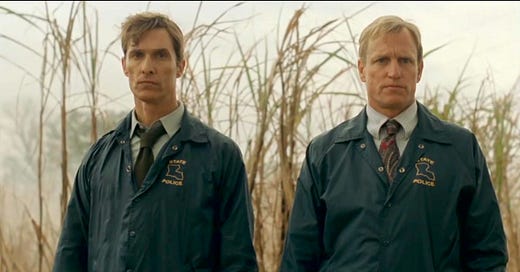rumination on true detective season 1
Biker gangs, revivalists, feds, all God-damned one way or the other.
I have been (re?)watching True Detective and taking notes on this old AlphaSmart keyboard my friend Connor gave me, with the intention of maybe writing an essay about its relationship to the Cthulu mythos. But then I read “For Now” by Eileen Myles, a complete stream-of-consciousness rumination on life and writing that was so free and enlivening to read, I thought, oh, I’ll just clean up my notes a little and not worry too much about grammar or structure and publish them so that’s what this is.

Allegedly, I saw the first season of True Detective in the winter of 2019, when I was living with Sarah in a house in Callicoon, New York. Allegedly, we watched the whole first season and maybe even the second. Maybe because we smoked before (while?) watching every episode or maybe because that was one of the winters of my discontent or maybe it had to do with the bleak southern landscape and Matthew McConaughey’s droning cynicism, but I seem to have been lulled — during those nights in front of the TV — into a semi-aware state, such that, five years later, trying to watch the series again, I only faintly remember certain imagery as if it’s been stewing in the depths of my subconscious (yes, I remember this shot of Matthew in the parking lot, looking around like it’s a nightmare he’s revisiting) but I can’t recall anything about the specifics of a show I once (allegedly) consumed in its entirety.
The script, acting, cinematography are all undeniably good. I adore the Woody-Matthew dynamic. But, what can I say, the detective work begins; my mind wanders. If I had to venture a guess, it’s that something in me — not unlike Harrelson’s character — deeply detests cynics (they are driving in a car along a dusty highway all pale blues and tan).
It’s not that I’m such a romantic, or even an optimist, it’s just isn’t the pursuit of awe and wonderment to be, in itself, an antidote to the depression we may otherwise succumb to when we realize that life is ultimately meaningless and futile? Eileen Myles describes their dog trembling under the body of a horse: “there’s so much shit and there’s so much horse.”
I know the universe is entropic. But my mind is capable of creating order and meaning and that is enough for me. “Whatever order is in the world is not given in our genes or exclusively supplied by nature,” wrote James Carey, then he quoted the biologist J.Z. Young, “‘the brain of each one of us does literally create his or her own world.’” Then he quoted Eric Vogelin, who said the order of history is “the history of order,” but that might be a whole different thing.
All to say, life doesn’t mean much of anything but mine must (and yours and yours and yours).
I find Rust’s brand of over-adherence to his own apathy to be a type of performance in itself — the kind he might otherwise mock — a compulsion to force everyone into the specific reality his brain has created. Luckily I made myself pay attention this go-around and realized that this is the point: Rust is a nihilist who only finds meaning in singular steadfast pursuits of justice. He turns out not just to care, but to care a whole hell of a lot. To care so much he can’t understand what kind of awful paralytics the rest of us are. “His philosophy is just intellectual window dressing for his grief” someone on Reddit writes.
(By the way? The Matthew and Michelle Monaghan scene? My mind was, I’ll say, not wandering then. Also by the way, this show, season 1, has never even heard of Alison Bechdel not to mention her little test. Also by the way. Isn’t it funny that the Bechdel Test is inherently a response to men?)
So, OK, nothing matters in the cosmic sense. If you accept that premise, and really accept it, it turns out not to be so interesting. Cynics are boring at best, completely mentally draining at worst. No matter how good the script. I don’t even really know if I’m using the word cynic right, but you get it.
Marty and Rust are standing at the back of a revival meeting under the shade of a big off-white tent, the kind they pitch up in the dead center of a barren field, next to some scraggly do-nothing tree, and all the women are wearing prairie dresses and all the men look like my childhood friends’ dads. “What do you think the average IQ is among this congregation?” Rust says, meanwhile he works at the behest of the American criminal justice system. See what I mean?
This is the genius of a show like The Wire — every organization is a religion and every organized religion is essentially the same. Sure there are good people. But to justify your belonging in one and denigrate the other — now that’s futility. That makes me think a little bit about astrology. There is a beauty in the kind of magical thinking that leads one to the stars, but an over-reliance on mysticism becomes just as limiting as anything else. It can be so draining now to talk to the astrology girlies; it’s like talking to an actuary.
Why do we love detective television? Perhaps it appeals jointly to both moralistic religiosity and our desire for earthly justice. Someone’s tracking down the bad guys, and he’s doing it with a kind of fervor that makes him a savior here on earth — one we don’t need to wait til heaven to meet. (That is what Matthew McConaughey starts to look like, by the way, if you can get through the bits in the beginning where he’s so unbearably dogmatic about his nihilism you wonder why he doesn’t take a bath with a toaster. He grows on you. And then he really grows on you. And I’m not just talking about the sex scene.)
Mysteries must be solved. Deaths must be avenged. If not in the afterlife then in this one. The present life. McConaughey and Harrelson are like two beautifully fucked up angels drinking themselves to oblivion, shooting up ink and cayenne, atoning for our sins if not their own.
Rust and Marty in Rust’s all-white apartment, both wearing white shirts. It’s a kind of purgatory they arrive in halfway through season one, just before they go undercover to try and catch their bad guy. Marty becoming Rust, Rust becoming Marty. They’re both pacing around doing meditative practices, drinking beer ruggedly. The cause consumes them. That is when I — we you us— move beyond apathy.
“This is how you get all warped,” Marty’s beleaguered wife tells Rust (and by “you,” she means men; again, she is always talking about men) “you always short-change the wrong things.”
2014 was a good year for McConaughey. Fresh off Wolf of Wall Street, best actor for Dallas Buyers Club, then this show. We love Matthew most when he’s fucked up, faithless, and scorning God. That is when he is at his most angelic.
In the absence of God we adapt a set of self-determined principles. All of our best anti-heroes do, including the True Detective boys; one set of tablets for another. Nail this on your door and adhere to it. This is the only way to get along. Otherwise, you might… you know. If Rust’s only true belief is entropy, then this too is a directive toward which his life will bend. When he ends up in a crack house shoot-out, that is the destiny he chose — it is the prophetic fate of a faithless man in a faithful world; how stupid do you have to be to stand beneath a revival tent, he once asked. Meanwhile, he was standing beneath a revival tent. In other words, if you are playing the game, you are as stupid or as smart as anyone else playing the game.
The conceit of cyclical narratives is basically nothing matters if you zoom out too far. Also what goes around comes around. Sometimes you don’t care so hard that you come back around to caring. (Remember when I said, I made myself pay attention this go-around and realized that this is the point — the point is, pay attention!). Once they abandon the game, Marty and Rust take the tape full of horrors (ritualistic child sexual abuse) and show it, one by one, to the men who betrayed their responsibility to stop such evil in the first place (that’s a little like The Ring, by the way). Don’t avert your eyes, they're saying.
An evil man with enough power does enough evil that it lasts forever; it comes back around like how when we were kids we thought we could swing all the way around the top bar of the swings. That’s how the evil thing goes even after the evil man dies or gets locked away; the evil never stops having an impact. With enough luck, it really comes back around — as in, it bites its originator in the ass. But it’s not luck that these children in True Detective need, is it? it’s something like salvation. (Now, a bad guy is humming while he paints the school building).
I think that True Detective season 1 ultimately says, hey, you can interrupt the cycle, but you can’t honestly, diligently, pursue the evils of this world while continuing to live in it as any normal person would. You can’t pick and choose.
That’s maybe why we love these detective series — leather-bound men impervious to societal norms, doing what we can’t. “I won’t avert my eyes,” Rust says, as he’s uncovering the web of corruption and violence to its dangerous end, “not again.” It’s not something he could do if he stayed a legit detective with a badge and a desk — he had to become (drum roll) a true detective. As in, one who pursues the truth.
The ties that bind society, are, in this telling, too morally corrupt to support their own destruction. Biker gangs, revivalists, feds, cults, all God-damned one way or the other. So you have to step outside of society. You have to go to a purgatorial state. You have to become an outlaw cop, operating from the basement of a bar (by the way, a bar is almost as neutral a place as a place can be — it is in some ways anti-revival tent — but it is also nearly impossible to go there too much without becoming a danger to yourself and/or others). Rust and Marty have to go rogue to get saved. Look at all the sacrifices they make along the way— their partners their careers their reputations their health; when these men are good at their jobs, they’re bad at everything else. No family, no friends, no one out there but each other. The only place for a moral person to go is in the cracks. Five years after I last (allegedly) took in this message, I’m more apt to believe it. 🪱




